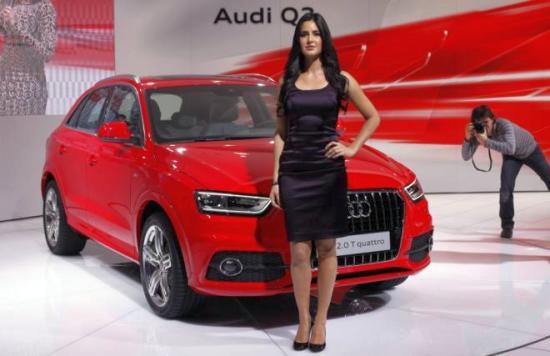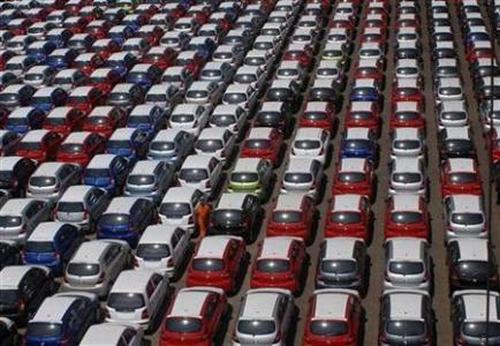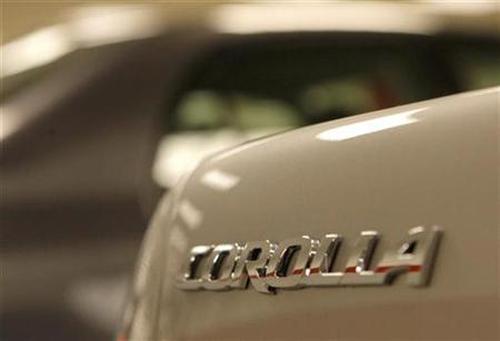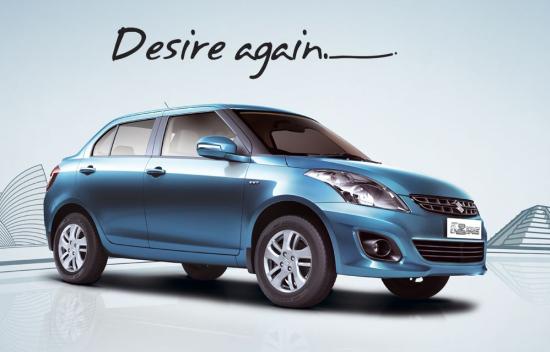Photographs: Reuters Trideep Lahkar and Rajkumar Leishemba in New Delhi
Beginning with a bang amid all the glitz and glamour of the biennial Auto Expo, the year will be ending with a whimper for the automobile industry as sales dwindle, and the worst-ever industrial violence at Maruti Suzuki's Manesar plant leaves a big scar.
New model launches such has Mini from BMW, Ertiga from Maruti Suzuki, Duster from Renault, Quanto from Mahindra & Mahindra and Sail U-VA from General Motors kept the consumers interested in a tough market. Yet, recalls by Ford, Toyota and Honda of their products added to the woes of the industry.
After witnessing the steepest monthly decline in nearly 11 years in October 2011, industry began 2012 with the Auto Expo in the National Capital, hoping for a brighter future.
Bollywood stars, including Amitabh Bachchan, Katrina Kaif, John Abraham and Ranbir Kapoor endorsed various brands, lent their star power to the show and attracted big crowds.
Ironically, that turned into a problem. Many business leaders, including Anand Mahindra, criticised poor crowd management, saying the week-long event was a "serious business" and not just a "tamasha".
The organisers also restricted entry to 100,000 daily, including 30,000 people from the exhibitors, a move that cost the expo its tag of being the world's second-largest auto show in terms of footfalls.
About 700,000 visitors visited the show, compared to over two million visitors in 2010 - which according to the organisers was the world's second-largest after the Shanghai auto show.
As many as 1,500 exhibitors and 50 global brands from 24 countries participated and the expo witnessed 58 new launches and unveiling of nine concept and 12 green vehicles.
However, due to limited space at Pragati Maidan, over 100 exhibitors from across the globe were denied participation. Later in the year, the organisers decided to shift the show to Greater Noida from the next Auto Expo in 2014.
Ta-Ta, Ratan: Tribute to an iconic Indian
...
Tepid sales, labour issues mark a rough year for auto
Photographs: Babu/Reuters
As the year progressed, excitement and optimism turned into gloom as sales fell in almost all segments forcing Society of Indian Automobile Manufacturers (SIAM) to revise growth projection for the fiscal downward twice.
In October, SIAM lowered car sales growth forecast to just 1-3 per cent for the fiscal, from the 9-11 per cent announced in July. Three months earlier, it had pegged car sales growth rate at 10-12 per cent. The industry body said with a subdued growth in sales, the forecast may be revised a third time next month.
So far this fiscal, 12,40,688 (1.24 million) cars have been sold – up just 1.28 per cent from the same period last year. Even the festive season failed to push sales with passenger car sales declining by 8.25 per cent in November.
Sales were hurt badly by rising fuel prices, high interest rates and overall low consumer sentiment. A big price difference between petrol and diesel added to the woes of those manufacturers, which predominantly make petrol vehicles as demand for diesel cars soared.
This led to some NGOs and a section of the government seeking additional duties on diesel vehicles to discourage the subsidised fuel being used by the "affluent".
With stiff opposition from SIAM and manufacturers, the government did not hike levies on diesel vehicles but speculation is rife that in the Budget for 2013-14, it may impose some additional duties on diesel vehicles.
Uncertainty of auto fuel policy became an issue for the industry, which demanded a long-term pricing roadmap of petrol and diesel so that they can plan their investments accordingly. On the other hand, Maharashtra government's VAT policy led to German auto giant Volkswagen putting on hold its plan to invest Rs 2,000 crore (Rs 20 billion) in India till around 2015.
Besides policy related issues, labour unrest hit Indian automobile sector hard during the year.
Ta-Ta, Ratan: Tribute to an iconic Indian
...
Tepid sales, labour issues mark a rough year for auto
Image: Police officials walk outside the Maruti Suzuki's plant in ManesarPhotographs: Reuters
Maruti Suzuki India (MSI), the country's largest car maker, witnessed the worst ever worker-employee violence in its history on July 18 that left one senior executive dead and nearly 100 others, mostly from management, injured at its new Manesar facility in Haryana.
The incident forced a month-long lockout at the plant and the overall loss of production was about 77,000 units. The plant was reopened in August and the firm sacked over 500 workers alleging their involvement in violence.
The move by the management didn't go down well with many central trade unions, which demanded reinstatement of the sacked workers as the police charge-sheeted only 145 people. However, the MSI management stood by its decision.
The cause of the violence remained unclear with the police's final report saying that it was a result of internal issues contradicted with that of the management's claim that external elements were responsible for the incident.
MSI chairman R C Bhargava, who even went to the extent that it was a pre-planed conspiracy by extreme left wing activists, reluctantly accepted the police report saying "Everybody has its own conclusion... It is something like an unknown disease by an unknown virus."
MSI rival and the country's second largest carmaker Hyundai Motor India also had its share of labour issues at its Chennai plant.
A section of employees under the banner of Hyundai Motor India Employees Union, affiliated to CITU, struck work for 10 days since October 30 pressing for various demands, including reinstatement of dismissed employees.
The strike was called off after a tri-partite meeting between the employees' union, management and the Labour Commissioner at Sriperumbudur. The company agreed to revoke the suspension of the 20 suspended workers, except five workers against whom a "domestic enquiry will be initiated".
Ta-Ta, Ratan: Tribute to an iconic Indian
...
Tepid sales, labour issues mark a rough year for auto
Photographs: Robert Galbraith/Reuters
Besides labour issues, recalls too hit the Indian auto industry. The year saw one of biggest ever such exercises in the country with Ford India recalling over 128,000 units of its best selling Figo and Classic cars to rectify problems related to steering and rear suspension.
Japanese auto giant Toyota also announced to recall 8,700 units of its premium sedan Corolla Altis and Camry in India to rectify faulty power window switches as part of a global drill.
Compatriot Honda too recalled 11,500 units of Standard variant of its premium motorcycle CBR 250R, which were produced and sold in India, due to defective brake system.
Following some major recalls by automakers in India in recent years and absence of any government policy on this, SIAM announced a voluntary vehicle recall policy, which recommended government to take action if any of its members failed to announce recall despite "clear evidence".
SIAM also said that it would assess the need for a mandatory policy if the government decides to frame one, although it would not oppose such a move.
The year also saw excitement when some automakers introduced new models in an attempt to bring back customers to the showroom. The most important of these was the new Alto, the country's best selling car, by Maruti Suzuki.
The company launched the new Alto in both petrol and CNG options, offered at introductory prices ranging between Rs 244,000 and Rs 356,000 (ex-showroom, Delhi). Developed at an investment of Rs 470 crore (Rs 4.7 billion), the new Alto tried its best to revive falling sales of MSI's petrol cars and currently enjoys a pending order of over 40,000 units.
Ta-Ta, Ratan: Tribute to an iconic Indian
...
Tepid sales, labour issues mark a rough year for auto
Image: Swift DzirePhotographs: Courtesy Maruti Suzuki India
Another blockbuster model that hit the roads during the year was the all new version of entry-level sedan DZire from MSI's portfolio. The model was relaunched under the sub- four metre length category to avail of tax benefits for small cars. It became immensely popular with buyers.
MSI also entered the utility vehicle segment during the year by rolling out the multi utility vehicle Ertiga. The model in both petrol and diesel options has drawn a large number customers and it has a long waiting period.
During the year, one of the most popular global models entered India. German major BMW launched it premium small car Mini at the Auto Expo. The four variants of the model have been priced between Rs 24.9 lakh and Rs 31.99 lakh. The BMW group had earlier planned to bring the car to India by 2009, but shelved the plan on account of market conditions.
General Motors launched a hatchback Sail U-VA from its Chinese partner SAIC's portfolio in India. The company has bet big on this model and hopes to become a significant player in the Indian car market.
Homegrown auto major Mahindra & Mahindra launched its first compact sports utility vehicle Quanto. The model is based on its existing Xylo's platform and has been able to register good bookings.
Rival Renault also introduced a compact SUV, Duster, in the Indian market. Despite limited presence in the country due to shortage of showrooms, the company is still witnessing robust demand for the model.
While the auto industry will want to zip past 2012, the year 2013 doesn't look like a smooth ride either, as sales are expected to remain subdued in a gloomy macro-economic environment.






article